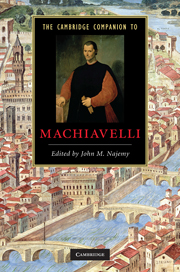Book contents
- Frontmatter
- Introduction
- 1 Niccolò Machiavelli: a portrait
- 2 Machiavelli in the chancery
- 3 Machiavelli, Piero Soderini, and the republic of 1494-1512
- 4 Machiavelli and the Medici
- 5 Machiavelli’s Prince in the epic tradition
- 6 Society, class, and state in Machiavelli’s Discourses on Livy
- 7 Machiavelli’s military project and the Art of War
- 8 Machiavelli’s Florentine Histories
- 9 Machiavelli and Rome: the republic as ideal and as history
- 10 Philosophy and religion in Machiavelli
- 11 Rhetoric and ethics in Machiavelli
- 12 Machiavelli and poetry
- 13 Comedian, tragedian: Machiavelli and traditions of Renaissance theater
- 14 Machiavelli and gender
- 15 Machiavelli’s afterlife and reputation to the eighteenth century
- 16 Machiavelli in political thought from the age of revolutions to the present
- Index
Introduction
Published online by Cambridge University Press: 28 September 2010
- Frontmatter
- Introduction
- 1 Niccolò Machiavelli: a portrait
- 2 Machiavelli in the chancery
- 3 Machiavelli, Piero Soderini, and the republic of 1494-1512
- 4 Machiavelli and the Medici
- 5 Machiavelli’s Prince in the epic tradition
- 6 Society, class, and state in Machiavelli’s Discourses on Livy
- 7 Machiavelli’s military project and the Art of War
- 8 Machiavelli’s Florentine Histories
- 9 Machiavelli and Rome: the republic as ideal and as history
- 10 Philosophy and religion in Machiavelli
- 11 Rhetoric and ethics in Machiavelli
- 12 Machiavelli and poetry
- 13 Comedian, tragedian: Machiavelli and traditions of Renaissance theater
- 14 Machiavelli and gender
- 15 Machiavelli’s afterlife and reputation to the eighteenth century
- 16 Machiavelli in political thought from the age of revolutions to the present
- Index
Summary
Machiavelli introduces himself nowhere better than in his correspondence, particularly with challenging interlocutors like Francesco Guicciardini, his younger contemporary who, when they exchanged a memorable set of letters in 1521, had already risen to political prominence and written a lively history of Florence as well as several memoranda on Florentine government. Their friendship was made possible by a shift in Machiavelli's political fortunes. After eight years in which the Medici had shunned Machiavelli following the 1512 coup d'état that restored them to power in Florence, their antagonism finally softened. Friends intervened to win the assent of Pope Leo X (Giovanni de' Medici) for a Roman performance of Machiavelli's play, Mandragola, and smoothed the way for Cardinal Giulio de' Medici's approval of Machiavelli's commission from the university (the Studio) to write a history of Florence. In May 1521, the Florentine government, again with Cardinal Giulio in the background, sent Machiavelli, who had once negotiated with kings, emperors, and popes, as its representative to the chapter general of the Franciscans in Carpi, near Modena, with instructions to promote a plan for the separate administration of Franciscan convents in Florentine territory. When the consuls of Florence's guild of manufacturers of woolen cloth learned of Machiavelli's assignment, they gave him the additional task of finding a Lenten preacher for the cathedral, whose administration was the guild's responsibility. Machiavelli, formerly an influential chancery official, adviser, military organizer, and diplomatic envoy for the republican government displaced by the Medici, was now on a mission of almost comical modesty.
- Type
- Chapter
- Information
- The Cambridge Companion to Machiavelli , pp. 1 - 13Publisher: Cambridge University PressPrint publication year: 2010
- 1
- Cited by

